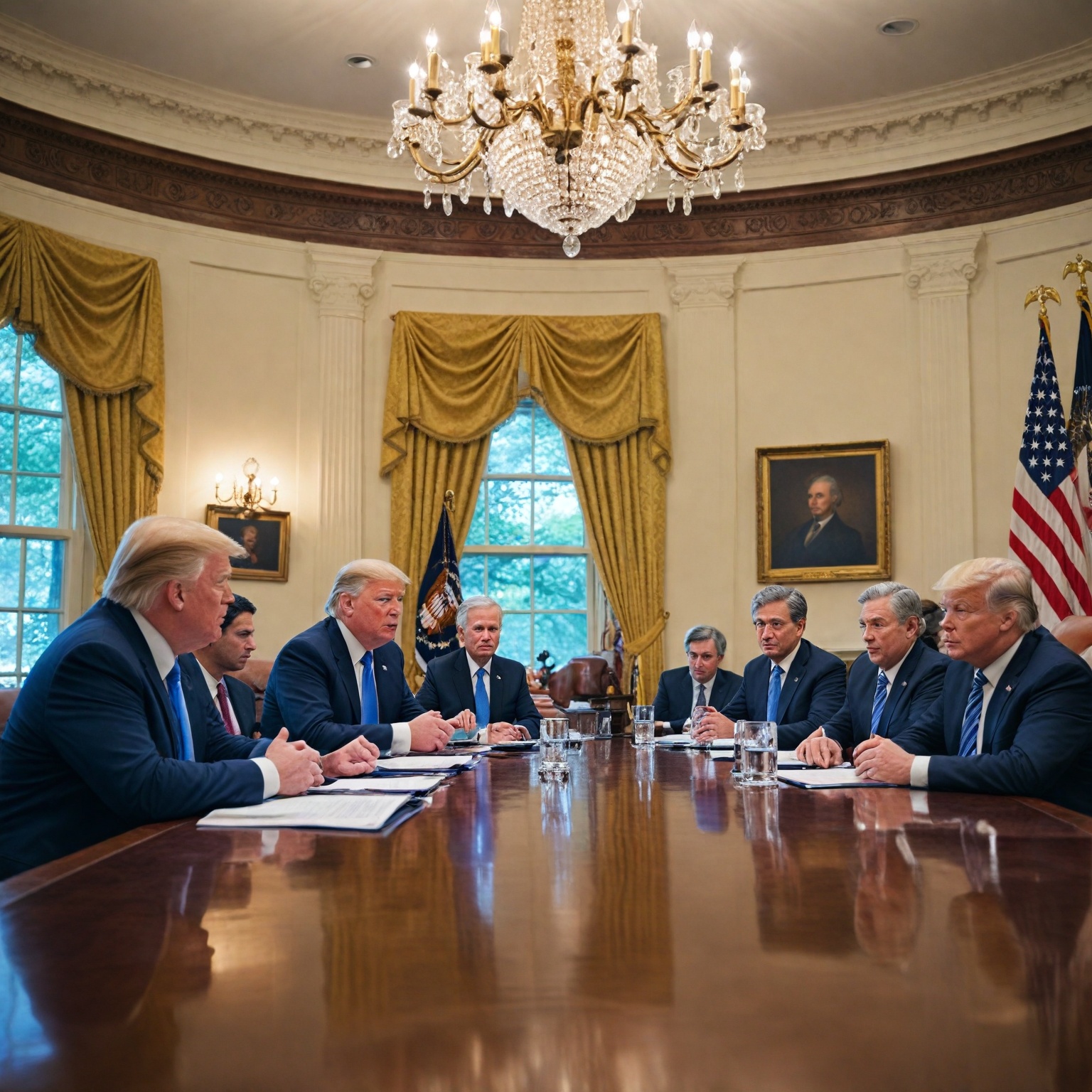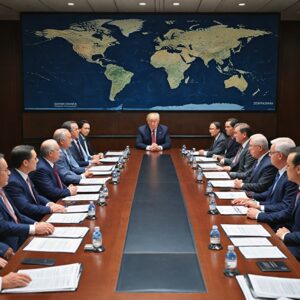Summary
Donald Trump’s alleged reconsideration of an early dismissal of Federal Reserve Chair Jerome Powell in 2025 sparked significant media attention and political debate, centered on reports that Treasury Secretary Scott Bessent played a key role in dissuading the former president from firing Powell prematurely. Powell’s term as Fed Chair was set to expire in 2026, and speculation about his removal intensified amid growing tensions within the Trump administration over monetary policy and Powell’s leadership style. The potential firing raised concerns about the independence of the Federal Reserve and the stability of financial markets, as abrupt changes to Fed leadership could have triggered legal, economic, and political repercussions.
The Wall Street Journal reported that Bessent cautioned Trump and other White House officials on the risks of dismissing Powell, emphasizing potential market destabilization and legal challenges. However, Trump publicly refuted these claims, labeling the reports as “typically untruthful” on his social media platform Truth Social and asserting that he did not require advice on market matters, underscoring his belief in his own judgment over economic policy. This dispute highlighted a broader divergence within the administration, where some officials openly criticized Powell while others, like Bessent, advocated for caution.
Bessent’s involvement was notable as it contrasted with other Trump allies who increasingly pressured Powell, reflecting internal divisions over Federal Reserve policy and the broader political environment. Analysts characterized the episode as illustrative of “fiscal dominance,” wherein political considerations risk compromising central bank autonomy. The debate over Powell’s tenure unfolded alongside other controversies facing the Trump administration, including legal disputes involving Sidney Powell, a lawyer known for promoting unfounded election fraud claims—a situation that further complicated the administration’s political landscape.
The controversy drew widespread media scrutiny, with coverage exploring the implications for U.S. economic policy and political stability. Trump’s outright rejection of the WSJ’s narrative underscored the contentious nature of the issue, reflecting ongoing tensions between the administration’s economic objectives and the Federal Reserve’s independent mandate. Meanwhile, efforts to identify legal grounds for Powell’s removal and discussions of his successor continued, emphasizing the complex and high-stakes nature of Federal Reserve leadership during this period.
Background
In mid-2025, speculation intensified regarding the potential early dismissal of Jerome Powell, Chair of the Federal Reserve, whose term was set to expire in 2026. Reports emerged suggesting that Treasury Secretary Scott Bessent played a crucial role in dissuading President Donald Trump from firing Powell prematurely, citing concerns over possible legal, political, and economic repercussions. Bessent publicly acknowledged that the formal process to select a new Fed chair had already begun, while also indicating that there were numerous qualified candidates both inside and outside the Federal Reserve system.
Despite these reports, President Trump publicly refuted the claims, labeling them as “typically untruthful” and asserting on Truth Social that he did not need anyone to explain to him what was best for the markets or the country. Trump criticized media coverage surrounding the issue and reaffirmed his own judgment regarding economic matters, emphasizing his belief that firing Powell would be detrimental to market stability.
The potential removal of Powell was controversial, as it could have disrupted the independence of the Federal Reserve and triggered market uncertainty. Experts noted that while no law prohibits the Treasury Secretary from simultaneously serving as Fed Chair, such a dual role would contradict the longstanding principle of central bank independence. Bessent himself expressed caution about intervening with the Fed, warning that “playing around with the Fed can have adverse consequences,” contrary to intended outcomes.
Amid this backdrop, the Trump administration experienced internal tensions over Federal Reserve policy and Powell’s leadership. Some administration officials publicly criticized Powell, while others, including Bessent, urged restraint due to the potential fallout from abrupt changes at the Fed. Powell defended his tenure and decisions, including significant initiatives like the $2.5 billion overhaul of the Federal Reserve’s headquarters.
The debate over Powell’s tenure and Bessent’s role unfolded alongside broader political and legal challenges faced by the Trump administration, including controversies involving figures such as Sidney Powell, whose promotion of baseless election fraud claims was ultimately disavowed by the Trump campaign. This context underscored the complex and often contentious environment in which the discussions about Federal Reserve leadership were occurring.
Trump’s Response to the WSJ Claim
In response to a Wall Street Journal report suggesting that Treasury Secretary Scott Bessent had to explain to former President Donald Trump the potential legal, political, and economic consequences of firing Federal Reserve Chair Jerome Powell before the end of his term, Trump strongly disputed the claims. Taking to Truth Social, Trump described the article as “typically untruthful” and asserted that he did not require any explanation about the risks involved in removing Powell. He stated, “I know better than anybody what’s good for the Market, and what’s good for the U.S.A.,” adding, “People don’t explain to me, I explain to them!”
While the report indicated that Bessent had cautioned White House officials about the destabilizing effects such an action could have on financial markets, Trump’s public rebuttal signaled a clear rejection of that narrative. His response underscored his belief in his own understanding of market dynamics and dismissed suggestions that he had been advised otherwise. Bessent’s stance reportedly marked a divergence from other top Trump administration officials, who had escalated their public criticism of Powell in recent weeks.
Examination of Bessents’ Actual Role
Scott Bessent, Treasury Secretary under the Trump administration, has been widely reported as a key figure who influenced President Trump’s decision not to fire Federal Reserve Chair Jerome Powell. Bessent, recognized as Trump’s chief dealmaker and Wall Street ambassador during the implementation of the tariff plan, was considered by some as a possible replacement for Powell. However, Bessent himself has downplayed such rumors, expressing satisfaction with his current role and indicating a willingness to comply with the president’s wishes if asked to take on new responsibilities.
Bessent’s involvement reportedly marked a departure from other Trump administration officials who publicly criticized Powell. He cautioned against the potential legal, political, and economic consequences of dismissing Powell, highlighting the risks associated with such an action. This stance was at odds with the increased public criticism of Powell from other members of the administration, and Trump publicly dismissed reports about Bessent’s influence as “typically untruthful”.
Analysts and insiders have suggested that Bessent’s warnings may have contributed to a more cautious approach within the administration regarding Powell’s dismissal, especially considering the possible legal challenges and market implications such a move might trigger. Despite this, discussions about Powell’s successor continued within Washington policy circles, with multiple names being floated.
Bessent’s role must also be understood within the broader context of the Trump administration’s tensions with the Federal Reserve and Powell’s monetary policies. Economists have described the administration’s actions as reflective of “fiscal dominance,” where political pressures interfere with central bank independence. Bessent’s caution thus reflected not only personal judgment but also concerns shared among economists about destabilizing economic and financial market conditions.
Connection to Sidney Powell and Trump Legal Team
Sidney Powell, a lawyer who was not officially part of the Trump campaign’s legal team, became a prominent figure in efforts to challenge the 2020 election results. She gained considerable attention for her vehement defense of baseless claims of election fraud and was embraced by President Trump and many of his allies. Powell frequently appeared alongside the campaign’s legal team at news conferences and was a repeated presence on pro-Trump media outlets, notably Fox News and Fox Business Network, where her allegations were broadcast to millions of viewers, including Trump himself.
Despite her high profile, the Trump campaign ultimately distanced itself from Powell. In a Sunday statement, the campaign clarified that “Sidney Powell is practicing law on her own,” effectively disavowing her legal efforts and separating her from the official team led by Rudy Giuliani and Jenna Ellis. This move came without explanation, signaling an abrupt shake-up in the campaign’s legal strategy.
Powell’s involvement had broader implications beyond the legal realm, influencing political dynamics and sparking internal controversy within the Trump administration. Her continued promotion of unfounded claims created difficulties for affiliated media outlets and campaign officials, who faced criticism and legal challenges, notably from Dominion Voting Systems, which protested being smeared by her accusations. Meanwhile, top administration officials like Treasury Secretary Scott Bessent publicly criticized Powell’s actions, citing potential legal, political, and economic fallout. Although President Trump dismissed reports linking Bessent to efforts to prevent actions against Federal Reserve Chair Jerome Powell as “typically untruthful,” the tensions highlighted the complex interplay between Powell’s role and the broader Trump legal and political apparatus.
Media and Public Reaction
The Wall Street Journal report suggesting that Bessent had to explain to former President Trump the potential market consequences of firing Federal Reserve Chair Jerome Powell sparked significant media coverage and public debate. Trump disputed the report through a post on Truth Social, labeling it “typically untruthful” and asserting that he understood better than anyone what was good for the market and the country. He emphasized that “People don’t explain to me, I explain to them!”.
Media outlets noted the broader implications of Powell’s potential dismissal, highlighting concerns about market stability and economic uncertainty. Analysts and economists characterized the mounting political pressure on Powell and the Federal Reserve as indicative of “fiscal dominance,” a situation where monetary policy is heavily influenced by fiscal considerations, potentially undermining central bank independence. This discourse included commentary from economists across the political spectrum, as well as statements from Powell herself about maintaining leverage ratios to support low-risk banking activities such as Treasury market intermediation.
Internally, some of Trump’s closest allies had grown critical of Sidney Powell’s election-fraud claims, despite public endorsements of these narratives by smaller media rivals. Private communications among Fox News hosts and executives revealed skepticism toward Powell’s assertions, with one host describing her as “a bit nuts” and others dismissing her claims as “nonsense” in sworn depositions. Nonetheless, the network’s executives expressed concern that contradicting election-fraud narratives might alienate viewers who had migrated to alternative outlets like Newsmax and One America, which actively championed those claims.
The media’s scrutiny of legal challenges surrounding Trump’s administration, including lawsuits against executive orders and election-related disputes, further framed the political climate. These developments were often tracked and reported as part of a broader narrative concerning the administration’s approach to governance and electoral legitimacy.
Aftermath and Developments
Following reports that Treasury Secretary Scott Bessent advised President Trump against firing Federal Reserve Chair Jerome Powell, significant developments and reactions emerged. Bessent’s stance represented a departure from other top allies of Trump, some of whom had recently intensified their criticisms of Powell. Trump publicly disputed reports about Bessent’s influence in persuading him not to dismiss Powell, challenging the veracity of The Wall Street Journal’s coverage on the matter.
Amid these tensions, Bessent indicated that a formal search for Powell’s successor was underway, emphasizing the importance of a clean transition. He suggested that Powell should consider stepping down from the Federal Reserve entirely at the conclusion of his chairmanship to avoid market confusion and promote stability, noting that traditionally the Fed chair also resigns as a governor. This recommendation underscored the administration’s preference for a distinct leadership change rather than a protracted overlap.
Concerns persisted regarding the potential economic and market implications if Powell were to be dismissed abruptly. Analysts warned that such an action could have significant adverse consequences, contrary to the administration’s intended outcomes. Powell himself defended his policies and decisions, including a notable $2.5 billion renovation of the Federal Reserve headquarters, which had drawn scrutiny from some within the administration.
Additionally, reports highlighted internal efforts by the White House to identify grounds for firing Powell “for cause,” presumably to strengthen the legal standing of any dismissal and withstand potential legal challenges. However, these attempts were met with skepticism and criticism from media outlets and legal observers, reflecting the complexity and contentious nature of the situation.
Examination of Bessent’s Actual Role
Scott Bessent, Treasury Secretary under the Trump administration, has been widely reported as a key figure who influenced President Trump’s decision not to fire Federal Reserve Chair Jerome Powell. Bessent, recognized as Trump’s chief dealmaker and Wall Street ambassador during the implementation of the tariff plan, was considered by some as a possible replacement for Powell. However, Bessent himself has downplayed such rumors, expressing satisfaction with his current role and indicating a willingness to comply with the president’s wishes if asked to take on new responsibilities.
Bessent’s involvement reportedly marked a departure from other Trump administration officials who publicly criticized Powell. He cautioned against the potential legal, political, and economic consequences of dismissing Powell, highlighting the risks associated with such an action. This stance was at odds with the increased public criticism of Powell from other members of the administration, and Trump publicly dismissed reports about Bessent’s influence as “typically untruthful”.
Analysts and insiders have suggested that Bessent’s warnings may have contributed to a more cautious approach within the administration regarding Powell’s dismissal, especially considering the possible legal challenges and market implications such a move might trigger. Despite this, discussions about Powell’s successor continued within Washington policy circles, with multiple names being floated.
Bessent’s role must also be understood within the broader context of the Trump administration’s tensions with the Federal Reserve and Powell’s monetary policies. Economists have described the administration’s actions as reflective of “fiscal dominance,” where political pressures interfere with central bank independence. Bessent’s caution thus reflected not only personal judgment but also concerns shared among economists about destabilizing economic and financial market conditions.
The content is provided by Blake Sterling, Fact-Nest













